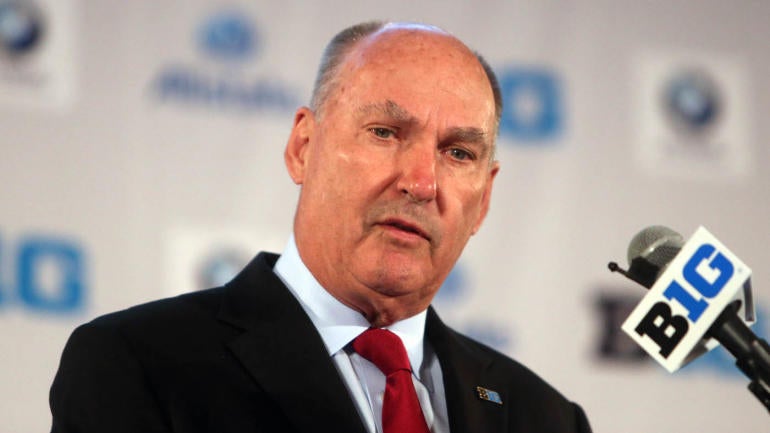
The Big Ten announced Monday that commissioner Jim Delany, 70, will retire from his position on June 30, 2020. That's nearly 30 years after initially taking over the conference and becoming one of the most powerful men in sports.
"It's been an amazing opportunity to serve and lead these preeminent institutions, presidents, administrators, coaches and students," said Delany in a release. "It is incredibly fulfilling to support the hundreds of thousands of young men and women who have been afforded an opportunity to obtain best-in-class educations as a result of the invaluable, one-of-a-kind lessons learned through the unique combination of athletic and classroom competition. I would like to recognize and thank each of my colleagues for being such invaluable members of, and contributors to, the Big Ten Conference team, while acknowledging that there is still plenty of work to be done. I look forward to continuing that work through the balance of my term."
Delany doubled down on not formally retiring in a conversation with CBS Sports, explaining that he plans to be active following his formal departure from running the Big Ten next summer.
"My health is really good. I don't feel any different than I did 10 or 15 years ago. Retirement as a certain connotation to it related to rest. I'm going to be doing some things, probably several things," he said. "I don't know if it will be teaching. I don't know if it will be speaking. I don't know if it will be consulting. I don't know if I open up a business. Some combination."
Delany began his tenure as the Big Ten's commissioner back in 1989, and plenty has changed in the conference and outside of it during his tenure. When Delany took over the job, the conference was still at 10 schools just like its name implies. Delany was instrumental in bringing Penn State into the fold in 1990 (football joined the conference in 1993). That addition was a complete surprise to some as Delany worked behind the scenes in 1990 to land the Eastern independent power. The expansion came during a time when college football was remaking itself.
The Supreme Court decision in 1984 that allowed schools to control their own TV rights led to a sea change. During that time Notre Dame signed up with its own network (NBC). The SEC expanded by two and signed on with CBS for a relationship that exists today.
By adding Penn State, Delany at least kept the Big Ten competitive on the national landscape. He then helped the Big Ten land Nebraska, Maryland and Rutgers 20 years later to expand to its current 14 teams, extending the league from the Great Plains to the Atlantic Ocean.
"We never had a goal of disrupting the ACC or the Big East. Basically, when the Big 12 was under pressure, we had a lot of interest from those institutions. Then, the world just kept changing," Delany told CBS Sports.
Delany oversaw the creation of the Big Ten Championship Game in football, as well as the launch of the Big Ten Network, as he helped bring the conference into the 21st century and keep it ahead of the curve on the always-evolving college football landscape.
It was a meeting with ESPN executive Mark Shapiro that changed the direction of the league in 2004. Delany thought the network's offer of approximately $100 million per year was too low. It was at that point that Delany set out to create the first-ever conference network. It was a tough slog but eventually became one of the biggest revenue producers in college sports. When the network began to take off, Delany sent a package to Shapiro that included a bottle of champagne and a note that said, "See, I did it."
The Big Ten was also the first conference to develop and implement an instant replay system during Delany's tenure.
It can be argued that without Delany's guidance there never would have been a BCS or College Football Playoff. It took the Big Ten (and Pac-10) and Rose Bowl to adjust their decades-long exclusivity agreement.
Lately, the league has gone through a tough run off the field. By the summer of 2018, 11 of the Big Ten's 14 schools had been involved in serious incident over the previous eight years.
Delany foretold his retirement decision at the Big Ten Media Days in 2018. When we asked him if he would be leading the league's media rights negotiations in 2022, Delany replied, "I won't be here in six years. I'm 68."
With Delany's departure, two of the most powerful men in college sports have left their positions since 2014. Former SEC commissioner Mike Slive retired in 2015 and died in 2017.
As for who will replace Delany, the release from the Big Ten indicated the conference would use the search firm Korn Ferry to find a suitable candidate. Delany's replacement will become the sixth person to fill the role of Big Ten commissioner, a position that was created in 1922.
Northwestern athletic director Jim Phillips is the favorite to succeed Delany. One of the nation's highest-paid ADs, Phillips has been with the Wildcats since 2008. He was elected as the inaugural chair of the NCAA Division I Council in 2015 and was the first active AD to sit on the NCAA Board of Directors and Board of Governors.
















